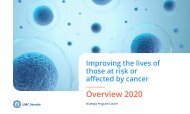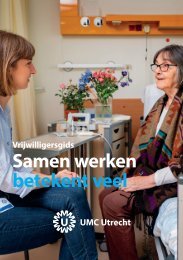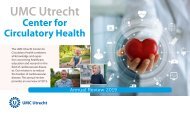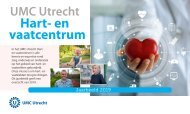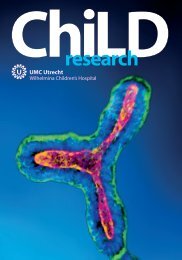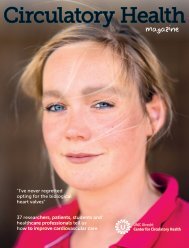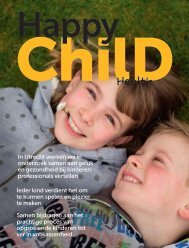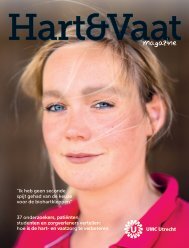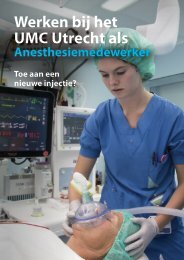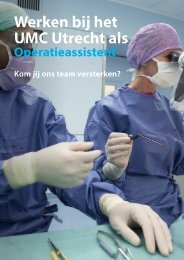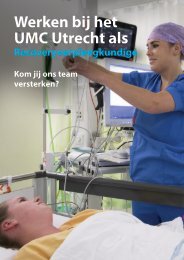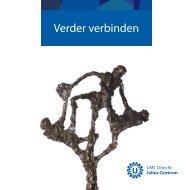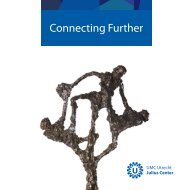RVB Translational Medicine Book
You also want an ePaper? Increase the reach of your titles
YUMPU automatically turns print PDFs into web optimized ePapers that Google loves.
<strong>Translational</strong><br />
<strong>Medicine</strong><br />
at the University<br />
Medical Center<br />
Utrecht
<strong>Translational</strong> <strong>Medicine</strong>…<br />
… is the process of translating research outcomes to tangible products that<br />
can be used in clinical practice;<br />
… also works the other way around: research questions should arise from<br />
clinical care and unmet medical needs;<br />
… is teamwork, and requires collaboration between researchers, clinicians,<br />
patient organizations, and industry;<br />
… unites the knowledge of these different fields and experts to increase the<br />
societal relevance of research and ultimately improve patient care.<br />
UMC Utrecht 1
Naam/titel<br />
subtitel<br />
bodytekst<br />
2 <strong>Translational</strong> <strong>Medicine</strong>
<strong>Translational</strong> <strong>Medicine</strong> at the University Medical Center Utrecht<br />
Berent Prakken<br />
Vice-dean for Education, UMC Utrecht, and Co-founder of the Eureka Institute<br />
One day, my friend and colleague Salvo Albani and<br />
I realized how many mistakes we had made while<br />
trying to develop immunotherapy. We committed<br />
ourselves to prevent young scientists from making the<br />
same mistakes. This started a long and unforeseen<br />
journey. We met like-minded people along this<br />
journey, and together we started the Eureka Institute.<br />
The aim of Eureka is to create a community of<br />
<strong>Translational</strong> <strong>Medicine</strong> professionals to increase the<br />
impact of science on patients. The initial<br />
accomplishment of Eureka was our certificate course,<br />
an international course in worldwide <strong>Translational</strong><br />
<strong>Medicine</strong> that was first offered in 2009.<br />
The mission of the University Medical Center Utrecht<br />
(UMC Utrecht) is to generate, evaluate, share and apply<br />
knowledge about health, illness, and care for the<br />
benefit of patients and society. This is in line with the<br />
vision and ambitions of Eureka. From that perspective,<br />
it was no surprise that UMC Utrecht joined<br />
Duke-National University of Singapore Medical School<br />
in becoming the first university partners of Eureka.<br />
Today, <strong>Translational</strong> <strong>Medicine</strong> is blooming at<br />
UMC Utrecht, in alignment with the philosophy of<br />
Science in Transition. In this book, you will find<br />
examples of that. But above all, it gives voice to<br />
scientific role models, most of whom are Eureka<br />
alumni. They explain what <strong>Translational</strong> <strong>Medicine</strong><br />
means to them, and how it is incorporated in their daily<br />
work. They share their expectations and hopes for the<br />
future. May their words convince you that we can<br />
increase the impact of biomedical research, and that<br />
we indeed can, and will, make good on our promise of<br />
improving patient’s lives!<br />
www.umcutrecht.nl/translationalmedicine<br />
www.eurekainstitute.org<br />
UMC Utrecht 3
Naam/titel<br />
subtitel<br />
bodytekst<br />
4 <strong>Translational</strong> <strong>Medicine</strong>
Science in Transition<br />
Frank Miedema<br />
Dean and Vice-Chairman of the Board, UMC Utrecht, and Co-founder of Science in Transition<br />
With the promise of new treatments and therapies,<br />
<strong>Translational</strong> <strong>Medicine</strong> is at the heart of biomedical<br />
research. But for a host of reasons, it may not always<br />
get the appreciation it deserves. With the Science in<br />
Transition initiative, which is rooted in UMC Utrecht<br />
and started in 2013, we aim to shed light on the<br />
incentive and reward system in biomedical science.<br />
We hope to push researchers to value efforts that bring<br />
results from the laboratory into clinical practice over<br />
publications in peer-reviewed journals.<br />
Science in Transition is one voice in a choir. Many<br />
analyses strongly suggest that current incentives,<br />
combined with hyper-competition for limited funds,<br />
contribute to the reproducibility crisis; to waste in<br />
research; and to poor translation of promising findings<br />
to clinical application. The inescapable conclusion is<br />
that we need new rewards and incentives for scientists,<br />
and that we should involve societal stakeholders in<br />
setting the research agenda. This conclusion and<br />
possible solution is echoed in the European Union’s<br />
‘Open Science’ agenda for science policy.<br />
UMC Utrecht takes its responsibility and intends to<br />
cultivate first-rate biomedical research and innovation.<br />
With Science in Transition, we make a plea for science<br />
that produces socially robust knowledge. We want to<br />
produce knowledge that answers relevant questions<br />
and benefits society. In the field of medicine, this<br />
means we have to make research ‘translational’.<br />
That is why I fully support Eureka and the efforts at<br />
UMC Utrecht to improve and expand <strong>Translational</strong><br />
<strong>Medicine</strong>.<br />
www.scienceintransition.nl<br />
UMC Utrecht 5
Naam/titel<br />
subtitel<br />
bodytekst<br />
6 <strong>Translational</strong> <strong>Medicine</strong>
“In my research, I collaborate with fundamental researchers, clinical researchers,<br />
and with other disciplines – for example with people who build bridges between<br />
research, clinical practice and society.”<br />
Sanne Nijhof<br />
Pediatrician and Postdoctoral Researcher<br />
UMC Utrecht 7
“Wietse Kuis is my role model, because he has a brilliant mind, is honest, is engaged<br />
with what he does, feels for his patients, and wants to dive into details in the lab to<br />
understand everything he sees in his patients.”<br />
Joost Swart<br />
Pediatric Rheumatologist and Immunologist<br />
8 <strong>Translational</strong> <strong>Medicine</strong>
UMC Utrecht 9
10 <strong>Translational</strong> <strong>Medicine</strong>
“The main problem is an increased gap between the amount<br />
of data that we generate in research and the ability to apply<br />
it into clinical practice, in a meaningful and impactful way.”<br />
Salvatore Albani<br />
Director of <strong>Translational</strong> Immunology Institute, Professor, Duke-NUS Graduate Medical School<br />
Singapore, Co-founder of the Eureka Institute for <strong>Translational</strong> <strong>Medicine</strong><br />
“With our broad scope, we try to cover the whole<br />
gradient of <strong>Translational</strong> <strong>Medicine</strong>, ranging from<br />
molecular biology to new products. This is very rare to<br />
find. The course offered by Eureka differs from most<br />
programs because of the international setting, and the<br />
way it is adapted to promote critical thinking and<br />
create awareness.” Most of all, Salvatore Albani wants<br />
to emphasize that Eureka is more than a program.<br />
“It establishes collaborations, it creates an international<br />
network. One could talk about the individual<br />
achievements, but Eureka is all about a group quest.<br />
In my opinion, the main problem in the medical world<br />
is an increased gap between the amount of data that<br />
we generate in research and the ability to apply it into<br />
clinical practice, in a meaningful and impactful way,”<br />
Salvatore explains. That is the reason why Salvatore<br />
and his colleagues founded the Eureka Institute: “to<br />
contribute to the growth of <strong>Translational</strong> <strong>Medicine</strong> in<br />
a way that is directly impactful to patients.”<br />
www.eurekainstitute.org<br />
UMC Utrecht 11
12 <strong>Translational</strong> <strong>Medicine</strong>
“I am very proud to be building the infrastructure, setting up the network, and<br />
obtaining the funding to study several diseases that have frustrated me in the clinic.<br />
I hope to provide better answers and therefore better treatments and guidance in<br />
the near future.”<br />
Michiel Schreuder<br />
Pediatric Nephrologist, Radboud University Medical Center, Amalia Children’s Hospital, Nijmegen<br />
UMC Utrecht 13
“I am most proud of having initiated and continued to build the Scientific Alliance<br />
between the Wilhelmina Children’s Hospital and Nutricia Research, with a focus on<br />
immune development and nutrition.”<br />
Belinda van ‘t Land<br />
Affiliated Senior Scientist<br />
14 <strong>Translational</strong> <strong>Medicine</strong>
Naam/titel<br />
subtitel<br />
bodytekst<br />
UMC Utrecht 15
Naam/titel<br />
subtitel<br />
bodytekst<br />
16 <strong>Translational</strong> <strong>Medicine</strong>
“The future of <strong>Translational</strong> <strong>Medicine</strong> will be especially<br />
bright if we can direct our combined efforts towards<br />
diseases with a large burden in difficult-to-reach<br />
populations around the world.”<br />
Joyce Browne, Assistant Professor, Global Health<br />
Lilly Verhagen, Postdoctoral Researcher and Pediatric Resident, Global Health<br />
“<strong>Translational</strong> <strong>Medicine</strong> is a continuous process in which<br />
you try to solve a problem in a lab setting, and then<br />
translate that back to your patients. We see whether it<br />
works, and go through the whole routine again until we<br />
reach clinical impact, rather than using a one-step bench<br />
to bedside translation.” In Lilly’s case, the focus is on<br />
respiratory tract infections and vaccination in global<br />
pediatric risk groups. These patients could be at risk<br />
because they live in a setting with low resources, or it<br />
could be a group of patients in The Netherlands with<br />
immune deficiencies - with an immune system that fails to<br />
properly protect against infections. “For me, one of the<br />
challenges is to tailor our vaccination strategies to the<br />
specific risk groups across the world, rather than the<br />
one-size-fits-all approach that we currently take:<br />
embracing rather than masking differences between<br />
populations. Joyce adds, ”I made the decision to focus on<br />
Global Health education and research. I want to focus on<br />
areas where the burden is high, and where I feel I can add<br />
the most value and impact with what I do. For<br />
<strong>Translational</strong> <strong>Medicine</strong>, this means thinking about how we<br />
can make innovations available at the bedside of patients<br />
all over the world. One of my research projects focuses on<br />
a ‘poly pill’, a pill that combines aspirin and calcium to<br />
prevent hypertensive disorders of pregnancy. This is one<br />
of the major killers of mothers and babies in the world. I<br />
set up the project to develop this pill for Low and Middle<br />
Income Countries. But at the moment, I am actually<br />
preparing a clinical trial in the Netherlands, using the same<br />
pill for Dutch women.” Both Lilly and Joyce agree that<br />
Global Health and <strong>Translational</strong> <strong>Medicine</strong> are related. “I<br />
would say that addressing global health issues requires<br />
the same methods and techniques in all fields and<br />
settings, plus some context-specific logistical challenges”,<br />
says Lilly. “You need to cross political, administrative,<br />
linguistic and cultural boundaries to address the patient’s<br />
most relevant questions. You need to look beyond the<br />
borders of your country,” adds Joyce.<br />
UMC Utrecht 17
18 <strong>Translational</strong> <strong>Medicine</strong>
“<strong>Translational</strong> <strong>Medicine</strong> requires teams consisting of clinicians and fundamental<br />
researchers, and aims to translate findings with the help of all team members to<br />
ensure that patients can benefit.”<br />
Sylvia Brugman<br />
Assistant Professor,<br />
Cell Biology and Immunology Group, Wageningen University<br />
UMC Utrecht 19
“I am most proud of having created an organoid-based screening platform that uses<br />
patient-specific organoids as models of disease.”<br />
Sabine Middendorp<br />
Associate Professor, Pediatric Gastroenterology<br />
20 <strong>Translational</strong> <strong>Medicine</strong>
UMC Utrecht 21
Naam/titel<br />
subtitel<br />
bodytekst<br />
22 <strong>Translational</strong> <strong>Medicine</strong>
“In my heart I am still a basic scientist, but it is amazing what<br />
kind of impact you can have on peoples’ lives.”<br />
Jeffrey Beekman<br />
Group Leader, <strong>Translational</strong> Research on Cystic Fibrosis, UMC Utrecht<br />
Recently, Jeffrey Beekman was one of the speakers at<br />
the largest conference on Cystic Fibrosis (CF) in the<br />
United States. Many parents of children with CF were<br />
present. “The vibe at this conference gave me goose<br />
bumps. I could feel the response to our research when<br />
everyone saw our experiments for the first time. When<br />
I talked to the parents afterwards, I learned that our<br />
research really had a large impact. It still gives me<br />
goose bumps.”<br />
Jeffrey has not always worked in the field of<br />
<strong>Translational</strong> <strong>Medicine</strong>. “As a basic scientist, you focus<br />
on scientific concepts and questions. Basic research is<br />
obviously needed, but I wanted to have more impact<br />
on patients’ lives. That is why I switched to the field of<br />
CF.” Jeffrey now collaborates with scientists from<br />
different disciplinary backgrounds. His team designed<br />
a test focussing on stem cells that could potentially be<br />
used for CF treatment. ”Together with the CF patient<br />
organisation we co-fund a program to enable<br />
individualized therapy for CF. What I like about having<br />
direct patient involvement: they keep you oriented on<br />
the impact of research for the patient. In the end, with<br />
our research we provide a service for the community.<br />
In my heart I am still a basic scientist, but it is amazing<br />
what kind of impact you can have on peoples’ lives.<br />
You hope and dream about what you may achieve, but<br />
this time it turned out to be even better in real life.”<br />
UMC Utrecht 23
24 <strong>Translational</strong> <strong>Medicine</strong>
“I hope the future of <strong>Translational</strong> <strong>Medicine</strong> will be bright and based on teamwork.<br />
In my view, the only way to succeed is to bring together people who have the<br />
creativity and freedom to think outside the box.”<br />
Hester den Ruijter<br />
Associate Professor, Experimental Cardiology<br />
UMC Utrecht 25
“The solution to major medical problems can often only be solved by a <strong>Translational</strong><br />
<strong>Medicine</strong> approach.”<br />
Louis Bont<br />
Pediatrician and Researcher<br />
26 <strong>Translational</strong> <strong>Medicine</strong>
Naam/titel<br />
subtitel<br />
bodytekst<br />
28 <strong>Translational</strong> <strong>Medicine</strong>
Education and Research on <strong>Translational</strong> <strong>Medicine</strong><br />
at UMC Utrecht<br />
<strong>Translational</strong> <strong>Medicine</strong> is a complex and<br />
interdisciplinary field. Clinicians, researchers, patients,<br />
and industry all need to be involved to ask research<br />
questions that are clinically relevant and translate<br />
research outcomes to tangible products at the bedside.<br />
<strong>Translational</strong> scientists, who are either PhDs with an<br />
interest in clinical research or clinician-scientists, need<br />
to obtain a broad range of skills to navigate the<br />
translational pathway. They need to learn how to work<br />
effectively in interdisciplinary teams and communicate<br />
with a broad range of stakeholders. Clinician-scientists<br />
have a dual role, as they are trained in both research<br />
and clinical practice, and can therefore play an<br />
important role in further closing the gap between<br />
research and clinical practice.<br />
UMC Utrecht invests in educating the next generation<br />
of translational scientists and in research to further<br />
improve training and career pathways for translational<br />
scientists. This is necessary, as becoming a successful<br />
translational scientist or clinician-scientist is<br />
challenging. The competitive funding system, the<br />
pressure to publish, and the lack of training and career<br />
pathways make this a challenge .<br />
The educational strategy of UMC Utrecht shows that<br />
educating translational professionals is of high<br />
importance for UMC Utrecht. This is illustrated by its<br />
focus on inter-professional education, strengthening<br />
the connection with patients, improving patient<br />
participation in education, and creating awareness of<br />
the societal impact of research.<br />
The Selective Utrecht Medical Master (SUMMA) is a<br />
concrete example of this, as it focuses on the training<br />
of clinician-scientists. The four-year SUMMA program is<br />
for students with a Bachelor’s degree in biomedical or<br />
life sciences, and combines a medical degree with a<br />
degree in clinical science. After four years, SUMMA<br />
graduates are prepared for a career that combines<br />
UMC Utrecht 29
clinical practice with research activities. These<br />
graduates can play an important role in the translation<br />
of research outcomes to patient care.<br />
UMC Utrecht also participates in further improving and<br />
developing the education of translational scientists<br />
and clinician-scientists in an international context.<br />
Crucial for this development is the partnership with<br />
the Eureka Institute. Together with Eureka, the<br />
UMC Utrecht embarked on several initiatives.<br />
In collaboration with University College London,<br />
University of Granada, Ghent University and Nutricia<br />
Research, UMC Utrecht successfully applied for a<br />
European Erasmus+ grant that resulted in the<br />
‘PATHWAY project’. The objectives of this project are to<br />
create efficient and sustainable career pathways for<br />
clinician-scientists, to integrate research and clinical<br />
components in the training of clinician-scientists, and<br />
to generate impact by raising awareness amongst<br />
stakeholders throughout Europe. Altogether, this<br />
contributes to an overall aim to bridge the gap<br />
between bench and bedside by training clinicianscientists<br />
for the academic and industrial workforce.<br />
In 2015, UMC Utrecht and the University of Toronto<br />
started an international research collaboration to<br />
support the clinician-scientist workforce. Research on<br />
the professional identity development, training, and<br />
career pathways of clinician-scientists is needed, as this<br />
workforce is both ageing and declining. The aim is to<br />
investigate how clinician-scientists develop their<br />
professional identity around their dual roles in both<br />
clinical practice and research, and how training and<br />
career pathways should improve to support<br />
early-career clinician-scientists. These studies are<br />
performed within the Eureka Network. The Julius<br />
Center for Health Sciences and Primary Care also<br />
performs research on general practitioners who<br />
become clinician-scientists, because a need for an<br />
increasing number of professionals with a research<br />
degree has also been identified within primary care.<br />
Together, the educational and research activities that<br />
take place within UMC Utrecht aim to improve the<br />
education and career support for these professionals,<br />
who are vital players in the field of <strong>Translational</strong><br />
<strong>Medicine</strong>.<br />
30 <strong>Translational</strong> <strong>Medicine</strong>
UMC Utrecht 31
32 <strong>Translational</strong> <strong>Medicine</strong>
“I am most proud of having contributed to the training and mentoring of young<br />
professionals and scientists, each with their own career paths. They are going to<br />
make the difference.”<br />
Femke van Wijk<br />
Associate Professor<br />
UMC Utrecht 33
“At the Neonatal Intensive Care Unit, continuous improvement in care for these<br />
small and very vulnerable human beings is mandatory to improve long-term<br />
outcome and quality of life. Historically, this population has been underrepresented<br />
in basic science and therapeutic research. I feel a responsibility to make research on<br />
neonates possible in the best clinical way.”<br />
Sanne Hoeks<br />
Pediatrician and Neonatologist<br />
34 <strong>Translational</strong> <strong>Medicine</strong>
UMC Utrecht 35
Naam/titel<br />
subtitel<br />
bodytekst<br />
36 <strong>Translational</strong> <strong>Medicine</strong>
“There is a bright idea or healthcare innovation and a firstin-man<br />
study has been done, so it is beautifully translated<br />
from the lab to human. But then, boom, still nobody knows<br />
whether it works or has impact in daily medical practice.”<br />
Carl Moons<br />
Professor of Clinical Epidemiology, Julius Center for Health Sciences and Primary Care<br />
“From my perspective, we can only speak of<br />
<strong>Translational</strong> <strong>Medicine</strong> when research results are<br />
applicable to the end-users. These end-users would<br />
include patients or care providers, and not only<br />
research going from the bench to the first-in-man<br />
studies.” For Carl it is obvious, “Medical science is often<br />
too discovery-driven. It is sexy to discover things or<br />
develop innovations, but not to validate or test these<br />
discoveries in the context for which the innovation is<br />
eventually to be applied. And that is what is needed<br />
before taking wide scale implementation of any<br />
innovation into practice. I used to be the same, in a<br />
way. We finished a phase 3 trial, described it in a<br />
beautiful paper, published it in a high impact journal<br />
and went on with the next trial. What I should have<br />
done is pick up the result, further explain it where<br />
needed, and bring it to the relevant stakeholders to<br />
make sure it entered the clinical guidelines.”<br />
Carl continues, “To me, <strong>Translational</strong> <strong>Medicine</strong> often<br />
seems less translational than it should be. Researchers<br />
and research teams often stop too early. From the start<br />
of the idea or conception of the innovation, we should<br />
work much more in multidisciplinary teams. This is<br />
needed in the entire chain to bring the idea into daily<br />
practice. Then <strong>Translational</strong> <strong>Medicine</strong> will be fully<br />
translational, and much more effective and impactful.<br />
It moves from discovery- and technology-driven to<br />
impact- and fit-for-purpose-driven. If you talk about<br />
decision support systems, for example, the end-users<br />
are you and I, and actually the whole population.<br />
Developing a decision support system or some<br />
e-health app is one thing, but evaluating whether it<br />
indeed has true impact on the health of the actual<br />
end-users in the intended context of the app is<br />
something else.”<br />
UMC Utrecht 37
38 <strong>Translational</strong> <strong>Medicine</strong>
“In my research, I try to keep in mind how patients can benefit from the results.<br />
I find this hard to accomplish, due to the fact that most research findings represent<br />
small steps ahead and need further research and optimizations before they can be<br />
really applied in daily clinical practice.”<br />
Pieter van Dijkhuizen<br />
PhD student, Pediatric Rheumatology<br />
UMC Utrecht 39
“I would call someone a translational scientist when the main objective of their<br />
research is to cross the ‘Valley of Death’ between promising pre-clinical results and<br />
making the drug or device part of daily clinical practice.”<br />
Roel Deckers<br />
Assistant professor, Imaging Division<br />
40 <strong>Translational</strong> <strong>Medicine</strong>
UMC Utrecht 41
Naam/titel<br />
subtitel<br />
bodytekst<br />
42 <strong>Translational</strong> <strong>Medicine</strong>
“At the UMC Utrecht, people talk about how the translational<br />
pathway works and if we need to challenge that paradigm.<br />
That is part of the uniqueness of the UMC Utrecht.”<br />
Norman Rosenblum<br />
Staff Nephrologist at The Hospital for Sick Children, and Senior Scientist Developmental<br />
& Stem Cell Biology, University of Toronto<br />
Asked about the relevance of <strong>Translational</strong> <strong>Medicine</strong>,<br />
Norman Rosenblum answers, ”<strong>Medicine</strong> exists today at<br />
a time where there is potential to bring a variety of<br />
discoveries to the clinical context and to wider<br />
populations. Populations of not necessarily sick people,<br />
but even healthy people for whom we seek to optimize<br />
health. There is tremendous potential to do this<br />
because of real revolutions in the biological sciences<br />
over the last 30 years, as well as in information<br />
technology, population health sciences, and artificial<br />
intelligence. The old way of thinking was about<br />
bringing discoveries to the market, but we now focus<br />
on technology and patient interfaces, information, and<br />
healthcare models. The patient has become a real<br />
partner, whereas before the patient was a target.”<br />
“The University of Toronto plays a big role in the field<br />
of <strong>Translational</strong> <strong>Medicine</strong> as a top-20 university in Life<br />
Sciences and top-3 university in pediatrics,” Norman<br />
explains. “But the UMC Utrecht does not just talk about<br />
<strong>Translational</strong> <strong>Medicine</strong>; it is trying to promote it as a<br />
way for people to engage in their science and in the<br />
application of their science. They are asking about<br />
patient’s priorities, asking about waste in science.<br />
From the Dean down, they are willing to do it.”<br />
UMC Utrecht 43
44 <strong>Translational</strong> <strong>Medicine</strong>
“I am most proud of having brought together different people into a<br />
multidisciplinary group. All had something to bring to the table, and the<br />
outcome will be bigger than all the individual input.”<br />
Joris van Montfrans<br />
Pediatrician<br />
UMC Utrecht 45
“I would call myself a clinician-scientist because I am translating clinical findings<br />
into new research projects, and translating lab findings into potential clinical<br />
applications. I do this within my own field of interest as well as in the projects of my<br />
colleagues or researchers that I meet.”<br />
Marije Bartels<br />
Pediatric Hematologist<br />
46 <strong>Translational</strong> <strong>Medicine</strong>
UMC Utrecht 47
Naam/titel<br />
subtitel<br />
bodytekst<br />
48 <strong>Translational</strong> <strong>Medicine</strong>
UMC Utrecht Eureka Summer Course<br />
on <strong>Translational</strong> <strong>Medicine</strong><br />
Participating in the Eureka/UMC Utrecht Summer<br />
Course on <strong>Translational</strong> <strong>Medicine</strong> is like entering a<br />
bubble. With a group of about 30 students and almost<br />
as many faculty members, you go through an intense<br />
week with a surprising mix of presentation formats and<br />
content, of social and scientific activities, and of regular<br />
and unorthodox teaching methods.<br />
And you are all in it together.<br />
The first thing you will notice is that the many<br />
inconvenient truths of the scientific enterprise are<br />
openly discussed. This reflects the fact that the<br />
UMC Utrecht is home to Science in Transition, an<br />
initiative that criticizes how incentives and rewards<br />
shape the quality and relevance of science.<br />
At the same time, inside the bubble you will find all the<br />
tools and knowledge to make a positive difference as a<br />
translational researcher. The dedicated faculty has an<br />
outstanding reputation as both translational scientists<br />
and as teachers. The curriculum is developed with the<br />
Eureka Institute, which has a decade of experience in<br />
<strong>Translational</strong> <strong>Medicine</strong>.<br />
But the most important part, of course, is your fellow<br />
travelers inside the bubble. They are young and<br />
motivated researchers from around the globe that<br />
meet each other in Utrecht with a common belief:<br />
that biomedical research can improve our lives, and<br />
that they can add to that.<br />
The inspiration and energy are contagious, and long<br />
after leaving the bubble you will feel the effects of the<br />
one-week course. You will no longer take ‘how science<br />
works’ for granted. You will feel empowered to make a<br />
change by reaching out to colleagues, peers and<br />
stakeholders, and together you will give biomedical<br />
research the impact that it should have.<br />
UMC Utrecht 49
UMC Utrecht Eureka Summer Course<br />
on <strong>Translational</strong> <strong>Medicine</strong><br />
Edition 2016<br />
“I am particularly impressed by the diversity of the groups and the fact that we will face the same<br />
situation when we would practice <strong>Translational</strong> <strong>Medicine</strong>. Also, I learned a lot about how to cope with<br />
challenges and hurdles. I will spread the concept of <strong>Translational</strong> <strong>Medicine</strong> in my home institution by<br />
writing an article in local journals.”<br />
Nikmah S Idris, Pulmonary Hypertension Clinical Fellow, Great Ormond Street Hospital and Paediatric<br />
Cardiology, Staff University of Indonesia.<br />
Alumna of the Summer Course, 2016 edition<br />
50 <strong>Translational</strong> <strong>Medicine</strong>
UMC Utrecht 51
UMC Utrecht Eureka Summer Course<br />
on <strong>Translational</strong> <strong>Medicine</strong><br />
Edition 2017<br />
“There are many examples of individuals and institutions who take the initiative to close the gap between research<br />
and clinical practice. However, it is impossible for individual institutions to change the system as a whole. During the<br />
summer school on <strong>Translational</strong> <strong>Medicine</strong> we came up with the idea of an ‘Impact Index’: a label that indicates what<br />
institutions already do to close the research-practice gap.<br />
This index would have two goals: to create transparency on ‘best-practices’ of institutions that already invest in<br />
improving the quality of research and translating research outcomes to the patient, and to encourage institutions<br />
that have fallen behind to invest in improving the quality of research, using the<br />
best-practices available.”<br />
Anneke Monninkhof, Nienke de Graeff, and<br />
Margot Weggemans<br />
Alumni of the Summer Course, 2017 edition<br />
52 <strong>Translational</strong> <strong>Medicine</strong>
UMC Utrecht 53
54 <strong>Translational</strong> <strong>Medicine</strong>
“I call myself a translational scientist because I directly implement the findings from<br />
our nephrogenetics research line to diagnostics, thereby translating research results<br />
to medical care.”<br />
Kirsten Renkema<br />
Assistant Professor, Genetics<br />
UMC Utrecht 55
“I am proud of the improved health care in the UMC Utrecht due to better<br />
collaboration in professional care teams and more focus on the patient perspective.”<br />
Petra Baarendse<br />
Senior Expert / Architect<br />
56 <strong>Translational</strong> <strong>Medicine</strong>
UMC Utrecht 57
Naam/titel<br />
subtitel<br />
bodytekst<br />
58 <strong>Translational</strong> <strong>Medicine</strong>
“From the beginning to the end, it should be about patients.<br />
So they need to be involved in promising research as often<br />
and as soon as possible.”<br />
Ingrid Lether<br />
Manager of Research and Innovation at Reumafonds (arthritis patient organization and research funder)<br />
“Our organization tries to involve patients in the<br />
different phases of research. Patients are part of our<br />
scientific advisory board. They look at the feasibility<br />
and relevance of the proposals. If the result of a<br />
proposal will not change clinical practice, it will not<br />
benefit them. A proposal like that may be scientifically<br />
interesting, but the patients tell us what is really<br />
important. We also encourage researchers to set up<br />
their own groups of patients to help them draft<br />
relevant research questions. A patient can tell the<br />
researcher what is bothering him or her most, for<br />
example. This is of course the preferred option:<br />
involvement of patients before a proposal is written.<br />
We can also ask patients to bring in their perspectives<br />
at meetings with the government and health insurance<br />
companies, to inform our research. From the beginning<br />
to the end, it should be about the patients. So they<br />
need to be involved in promising research as often and<br />
as soon as possible,” Ingrid explains.<br />
In the Netherlands, arthritis researchers from Utrecht<br />
enjoy a good reputation, Ingrid thinks. “There is a<br />
concentration of knowledge about arthritis at Utrecht<br />
University and the University Medical Center. Utrecht<br />
could also be a leader when it comes to spinning off<br />
small companies in this field.” Ingrid says<br />
enthusiastically, “In my opinion, one of the main<br />
achievements of our charity in relation to <strong>Translational</strong><br />
<strong>Medicine</strong> is that we realized that we need these small<br />
companies to bring new treatments to the market.”<br />
UMC Utrecht 59
60 <strong>Translational</strong> <strong>Medicine</strong>
“In the future, <strong>Translational</strong> <strong>Medicine</strong> will become more and more important – but in<br />
our efforts to connect with the clinic we will have to be careful not to lose touch with<br />
basic scientists.”<br />
Caroline Lindemans<br />
Pediatric Immunologist, and Bone Marrow Transplantation Specialist<br />
UMC Utrecht 61
“My research and hypotheses are always driven by patients’ needs, and aim to<br />
increase awareness of problems within certain areas of health care. They don’t<br />
always directly or immediately impact patient care, but in my opinion that is okay if<br />
the research still supports patients’ needs or draws attention to healthcare areas in<br />
need of change and innovation. In the long term, we will see the impact of this<br />
research.”<br />
Aisha Gohar<br />
PhD Student<br />
62 <strong>Translational</strong> <strong>Medicine</strong>
UMC Utrecht 63
Naam/titel<br />
subtitel<br />
bodytekst<br />
64 <strong>Translational</strong> <strong>Medicine</strong>
“<strong>Translational</strong> <strong>Medicine</strong> is not the Holy Grail,<br />
but it really makes science better.”<br />
Jorg van Loosdregt, <strong>Translational</strong> Immunology Researcher, Group Leader of the van Loosdregt/Vastert group<br />
Bas Vastert, Pediatric Rheumatologist and Researcher, Group Leader of the van Loosdregt/Vastert group<br />
“Working together with Bas, a pediatrician, makes my<br />
work more relevant and more fun”, says Jorg, a basic<br />
researcher. “As a fundamental scientist, I learn a lot from<br />
Bas about disease, disease mechanisms, how patients<br />
feel, and what they find important. This applies to all<br />
members of our research group: we learn a lot from each<br />
other. We perform clinical trials based on fundamental<br />
research we did in the lab, and that is just one example of<br />
many tangible results of our collaboration.”<br />
Bas continues, “I need this environment of smart<br />
scientists, with the focus and time to work on clinically<br />
relevant problems. Science gets better when people are<br />
continually present for brainstorming and problem<br />
solving. We both explicitly opted for <strong>Translational</strong><br />
<strong>Medicine</strong>. To us, it is the missing link to make science<br />
relevant. <strong>Translational</strong> <strong>Medicine</strong> is not the Holy Grail, but<br />
it really makes sciences better.” The van Loosdregt/<br />
Vastert lab is engaged in clinical science, but also in<br />
fundamental science. Since these are the two extremes,<br />
everything in between is also present in the group.<br />
Jorg explains, “We do super-fundamental DNA and RNA<br />
research, and we try to understand the biology of<br />
disease.” Bas adds, “But it all has to be translatable, it has<br />
to have impact on our patients. It is unrealistic to think<br />
that we can develop a new drug in a couple of years, but<br />
we can make smarter use of existing drugs, combine<br />
drugs in different ways, or put the right drugs in the right<br />
order for our patients. Embedding our efforts in a bigger<br />
organization or context is very important. We cannot do<br />
this alone in our group; we need local support. We also<br />
need to work with powerful partners, so that we have<br />
sufficient budget and freedom to do our work.<br />
We definitely see a transition here at the University<br />
Medical Center Utrecht in favor of <strong>Translational</strong> <strong>Medicine</strong>,<br />
but there is a long road ahead of us.” For Bas and Jorg it is<br />
obvious that working as a team has a clear advantage,<br />
and that patients benefit from this collaboration. They<br />
joke, “We can’t turn back anymore.” But more seriously,<br />
they add, “We really believe in <strong>Translational</strong> <strong>Medicine</strong> and<br />
that it will improve patient care.”<br />
UMC Utrecht 65
66 <strong>Translational</strong> <strong>Medicine</strong>
“My role model is Hans Clevers. He is a pioneering scientist with a great worldwide<br />
scientific and societal impact due to his ground-breaking discoveries. Organoid<br />
technology will revolutionize personalized and <strong>Translational</strong> <strong>Medicine</strong>.”<br />
Antoni Hendrickx<br />
Senior scientist, Hubrecht Organoid Technology<br />
UMC Utrecht 67
“I foresee that precision medicine will become more important with regards to<br />
diagnosis and treatment of diseases, with <strong>Translational</strong> <strong>Medicine</strong> being at the<br />
forefront of these developments.”<br />
Marne Hagemeijer<br />
Postdoctoral Researcher<br />
68 <strong>Translational</strong> <strong>Medicine</strong>
UMC Utrecht 69
Naam/titel<br />
subtitel<br />
bodytekst<br />
70 <strong>Translational</strong> <strong>Medicine</strong>
“Academia and industry need to work together to bring<br />
new concepts to the market.”<br />
Johan Garssen<br />
Director Platform Immunology at Nutricia Research, and Professor of Immunopharmacology at<br />
Utrecht University<br />
“At Nutricia, the majority of my work focuses on<br />
translatability, to develop things that can directly help<br />
patients. It is always in the back of my mind: can I<br />
translate this into something that can be used by<br />
patients 10 years from now? I think that both academia<br />
and companies like Nutricia have changed over the last<br />
years. Let’s be honest, ten years ago we would just look<br />
at your CV and ask how many publications you have as<br />
a scientist and what the impact factor is. This is still<br />
important, but now there is another aspect: translating<br />
science into something that can help patients and<br />
prevent diseases.”<br />
“I am in a unique position since 2005, having a parttime<br />
position with both Nutricia and the Faculty of<br />
Science of Utrecht University,“ says Johan when he talks<br />
about his two jobs. “I do fundamental work on immune<br />
regulation at the university which is not directly<br />
translatable, but I combine it with experiments that will<br />
hopefully lead to new drugs, medical food, or food for<br />
pregnant women or babies.” He concludes, “You need<br />
academia for the basic knowledge, and you need<br />
industry to translate the scientific concept into the<br />
actual drug or nutritional product or vaccine. Academia<br />
and industry need to work together to bring new<br />
concepts to the market.”<br />
UMC Utrecht 71
72 <strong>Translational</strong> <strong>Medicine</strong>
“My role model is Leonard Cohen: There is a crack in everything,<br />
that is where the light gets in.”<br />
Gijs van Haaften<br />
Associate Professor, Group Leader<br />
UMC Utrecht 73
“Translating the needs and languages of one discipline to another is truly<br />
challenging, but it is pivotal in order to share knowledge and to come to<br />
novel solutions.”<br />
Christiaan Vinkers<br />
Psychiatrist<br />
74 <strong>Translational</strong> <strong>Medicine</strong>
UMC Utrecht 75
Naam/titel<br />
subtitel<br />
bodytekst<br />
76 <strong>Translational</strong> <strong>Medicine</strong>
“My involvement with Apollo Society makes me think critically<br />
about the topics of my projects and what the contribution is to<br />
the health of patients”<br />
Gautam Kok and Remi Stevelink, Utrecht University students, and Board members of Apollo Society Utrecht<br />
Apollo Society is an active international network of<br />
likeminded students with an interest in <strong>Translational</strong><br />
<strong>Medicine</strong>. It was founded in 2014 by four medical students<br />
from Utrecht. Gautam explains, “There was a lack of<br />
courses on <strong>Translational</strong> <strong>Medicine</strong> in our curriculum so we<br />
decided to teach ourselves. We gather once a month to<br />
discuss topics related to <strong>Translational</strong> <strong>Medicine</strong>. These<br />
discussions tend to be very lively. Everyone chooses a<br />
topic, and we look at these topics from multiple<br />
perspectives, including medical, ethical and political<br />
points of view.” Following the example of Utrecht, the<br />
University of Toronto started an Apollo group as well.<br />
“We are currently writing an article in collaboration with<br />
the Apollo group in Toronto on <strong>Translational</strong> <strong>Medicine</strong><br />
about the role of students in promoting <strong>Translational</strong><br />
<strong>Medicine</strong> globally. In the future, we want to expand Apollo<br />
to different hubs: the universities of Miami and Arizona,<br />
and University College London.” Why is <strong>Translational</strong><br />
<strong>Medicine</strong> important to them? Gautam reflects, “I was<br />
doing lab research, trying different kinds of drugs on cell<br />
lines. I was tucked away somewhere in a lab and did not<br />
know what I was doing exactly and what I was doing it for.<br />
That was the moment when I decided to become a doctor<br />
as well, and combine research with patient care.” Remi<br />
says, “Actually, a similar story applies to me. I found out<br />
that many researchers, including myself, had never met a<br />
patient. I did research on autism, but I had never met<br />
someone with autism. And I think my professor had never<br />
met any patient with autism either. I realised that this was<br />
not the way to go forward and I decided to study<br />
medicine as well as doing research to actually make a<br />
difference on the health of patients.” Remi continues,<br />
“My involvement in Apollo makes me think critically about<br />
the reasons for choosing a particular project and the<br />
contribution to health in general. Currently, I am doing<br />
research on epilepsy. I use genetics to predict treatment<br />
outcomes, eventually leading to personalised medicine.<br />
The parents of my epilepsy patients fund my research.<br />
Since the parents are involved in the questions I try to<br />
answer, I actually produce something that is relevant to<br />
them. That keeps me motivated.”<br />
UMC Utrecht 77
78 <strong>Translational</strong> <strong>Medicine</strong>
“My role model is embodied in several different people, both clinician-scientists and<br />
clinicians, whom I encountered during my career so far. They are my role models<br />
because of their integrity, perseverance, passion for their work, belief in what they<br />
do, and belief in the people they do their work with.”<br />
Maja Bulatović Ćalasan<br />
Internal <strong>Medicine</strong> Resident<br />
UMC Utrecht 79
“<strong>Translational</strong> <strong>Medicine</strong> is part of my every day work. I work together with clinicians<br />
and basic scientists, and have numerous collaborations with private partners,<br />
all aiming to improve diagnosis and care by making use of translational research.”<br />
Imo Hoefer<br />
Associate Professor, Head of Central Biobank<br />
80 <strong>Translational</strong> <strong>Medicine</strong>
UMC Utrecht 81
Naam/titel<br />
subtitel<br />
bodytekst<br />
82 <strong>Translational</strong> <strong>Medicine</strong>
“The field of medicine is changing very fast. It is difficult<br />
to prepare our current students for future challenges, and<br />
we need students who are able to collaborate with people<br />
from different backgrounds to kickstart innovation.”<br />
Annet van Royen-Kerkhof<br />
Pediatrician, Associate Professor, Program Director of Selective Utrecht Medical Master (SUMMA)<br />
Annet van Royen-Kerkhof speaks enthusiastically about<br />
SUMMA, the four-year Medical Master Programme at<br />
the University Medical Center Utrecht. “The small scale<br />
of the program guarantees close interaction with the<br />
students. Our students already have a Bachelor degree<br />
in a field related to Life Sciences, so they are able to<br />
challenge you as a teacher and add different<br />
perspectives to the discussion.<br />
In my opinion, the field of medicine is changing very<br />
fast. It is difficult to prepare our current students for<br />
future challenges, but what we do know is that we<br />
need students who are able to interact and collaborate<br />
with people from different backgrounds. For example<br />
with technicians, since many innovations start at the<br />
interface of medicine and technique.<br />
In an ideal world, our SUMMA students would<br />
collaborate with students from other master programs<br />
on real life problems that cannot be solved by a single<br />
research group. This would contribute to my main aim:<br />
to teach students to think outside the box, to be<br />
creative, and not to be hampered by existing<br />
structures.”<br />
UMC Utrecht 83
84 <strong>Translational</strong> <strong>Medicine</strong>
“I feel that frequent inspiration by clinical problems or patients is the most<br />
important aspect of <strong>Translational</strong> <strong>Medicine</strong>. After all, both fundamental and clinical<br />
scientists can perform <strong>Translational</strong> <strong>Medicine</strong>, but their orientation matters:<br />
are they inspired by patients and their problems, or do they merely wish to solve<br />
their own experimental problems?”<br />
Henk Schipper<br />
Pediatric Cardiology Fellow<br />
UMC Utrecht 85
“My drive in doing translational science is to understand the molecular mechanisms<br />
of disease pathogenesis in the liver and gastrointestinal tract. Together with<br />
partners, such as clinicians, pharmaceutical companies, and patient representatives,<br />
I aim to translate this knowledge into therapy or diagnostic tools for the benefit of<br />
human health.”<br />
Saskia van Mil<br />
Associate Professor, and Group Leader at Center for Molecular <strong>Medicine</strong><br />
86 <strong>Translational</strong> <strong>Medicine</strong>
UMC Utrecht 87
Naam/titel<br />
subtitel<br />
bodytekst<br />
88 <strong>Translational</strong> <strong>Medicine</strong>
“We have one research line from the bed of the patient<br />
to the molecules in the lab. It is not a one-way street:<br />
it is dynamic and it goes back and forth.”<br />
Jeroen Pasterkamp<br />
Professor of <strong>Translational</strong> Neuroscience, Director of MIND Facility, and Chair of Strategic Research<br />
Program Brain<br />
The lab of Jeroen Pasterkamp is translational in several<br />
different ways. He explains, “First of all, we try to<br />
understand how the brain normally develops and<br />
works, from a basic research perspective. We use the<br />
normal situation as a standard, and then compare it to<br />
the injured or diseased situation. Another strategy is to<br />
use genetic information, brain resection material, or<br />
cultured human neurons from patients as a starting<br />
point. We can then use this to identify the cellular and<br />
molecular mechanisms that are affected in different<br />
diseases.”<br />
“<strong>Translational</strong> <strong>Medicine</strong> in the field of neurosciences is<br />
different from other fields, because the nervous system<br />
is a complex organ and we do not know much about it.<br />
We are trying to fix the patient’s problem, but at the<br />
same time we are trying to understand how the brain<br />
works,” Jeroen explains.<br />
The enthusiastic professor is proud of having achieved<br />
an efficient method to work with the clinic for studying<br />
both motor neuron disease and epilepsy. “For example,<br />
we have one research line in studying ALS, or<br />
amyotrophic lateral sclerosis, that extends from the bed<br />
of the patient to the molecules we study in the lab. It is<br />
not a one-way street: it is dynamic, it goes back and<br />
forth. And, we collaborate with the entire world.”<br />
UMC Utrecht 89
90 <strong>Translational</strong> <strong>Medicine</strong>
“What I am proud of is that, together with my research group, we came up with the<br />
“idea” of radioactive holmium microspheres as a possible treatment of liver tumors<br />
into a real product for treatment of liver tumors, available for all patients in<br />
Europe.”<br />
Frank Nijsen<br />
Associate Professor<br />
UMC Utrecht 91
“We live in a very exciting time with spectacular technological possibilities,<br />
including next generation sequencing, gene editing, stem cell (organoid) in vitro<br />
modelling, transcriptomics, metabolomics, large compound screens... Information<br />
technology enables world wide access to international expertise and patient<br />
sharing. If embedded in a collaborative, patient-oriented, creative, inspiring and<br />
critical environment, we should be able to raise translational medicine to<br />
great heights!<br />
Sabine Fuchs<br />
Pediatrician in Metabolic Diseases with dedicated research time<br />
92 <strong>Translational</strong> <strong>Medicine</strong>
UMC Utrecht 93
Colophon<br />
Final Editing<br />
Maggy Ovaa<br />
Texts<br />
Rinze Benedictus, Sandra Genet, Margot Weggemans<br />
Printed by<br />
De Bondt grafimedia<br />
Sponsored by<br />
K.F. Hein Fonds<br />
With the support of / thanks to:<br />
Salvatore Albani, Petra Baarendse, Marije Bartels, Jeffrey Beekman,<br />
Louis Bont, Joyce Browne, Sylvia Brugman, Maja Bulatovic-Calasan,<br />
Roel Deckers, Pieter van Dijkhuizen, Sabine Fuchs, Johan Garssen,<br />
Aisha Gohar, Gijs van Haaften, Marne Hagemeijer, Antoni Hendrickx,<br />
Sanne Hoeks, Imo Hofer, Gautam Kok, Belinda van ‘t Land,<br />
Caroline Lindemans, Ingrid Lether, Jorg van Loosdregt,<br />
Sabine Middendorp, Frank Miedema, Saskia van Mil,<br />
Joris van Montfrans, Carl Moons, Sanne Nijhof, Frank Nijsen,<br />
Jeroen Pasterkamp, Berent Prakken, Kirsten Renkema, Erica Roks,<br />
Norman Rosenblum, Annet Van Royen-Kerkhof , Hester den Ruijter,<br />
Henk Schipper, Michiel Schreuder, Remy Stevelink, Joost Swart,<br />
Bas Vastert, Lilly Verhagen, Christiaan Vinkers, Femke van Wijk<br />
Translations<br />
Alexandra Cloherty<br />
Photography<br />
Thirza Luijten<br />
Lay-out<br />
Barbara Hagoort<br />
Order management<br />
UMC Utrecht, Design & Producties,<br />
Jelle Westerhoff<br />
Tel +31 (0)88 75 662 00<br />
94 <strong>Translational</strong> <strong>Medicine</strong>
UMC Utrecht 95
96 <strong>Translational</strong> <strong>Medicine</strong>
January 2018
www.umcutrecht.nl/translationalmedicine



